Riley Bailey
Ukrainian armored vehicles are operating beyond the final line of the Russian defensive layer that Ukrainian forces in western Zaporizhia Oblast are currently penetrating, although ISW is not yet prepared to assess that Ukrainian forces have broken fully through this Russian defensive layer. Geolocated footage posted on September 21 indicates that Ukrainian armored vehicles advanced south of the Russian anti-tank ditches and dragon’s teeth obstacles that are part of a tri-layered defense and engaged in limited combat immediately west of Verbove (18km southeast of Orikhiv).[1] It is unclear if Ukrainian forces retain these positions, however. This is the first observed instance of Ukrainian forces operating armored vehicles beyond the Russian tri-layer defense.[2] The presence of Ukrainian armored vehicles beyond the final line of the current Russian defensive layer indicates that the Ukrainians have secured their breach of the first two lines of this layer sufficiently to operate vehicles through the breach. Ukrainian forces have likely suppressed Russian artillery and other anti-tank systems in the area enough to bring their vehicles forward.[3] The Ukrainian ability to bring armored vehicles to and through the most formidable Russian defenses intended to stop them and to operate these vehicles near prepared Russian defensive positions are important signs of progress in the Ukrainian counteroffensive.[4] Additional geolocated footage published on September 20 and 21 indicates that Ukrainian forces also advanced west and southwest of Verbove.[5]
The Wall Street Journal (WSJ) reported on September 21 that Ukrainian forces have breached the main Russian defensive line in western Zaporizhia Oblast with armored vehicles, citing an unnamed Ukrainian officer serving in the area.[6] WSJ also reported that Ukrainian forces have advanced to the edge of Novoprokopivka (16km south of Orikhiv), although ISW has not observed visual confirmation of this report as of this publication.[7]
Russian forces currently defending in western Zaporizhia Oblast have been unable to prevent Ukrainian forces from making gradual but steady advances since mid-August. ISW has consistently observed Ukrainian forces making slow but regular advances in western Zaporizhia Oblast despite the Russian military’s lateral redeployment of elements of relatively elite units to reinforce Russian defensive operations in western Zaporizhia Oblast.[8] The Russian military laterally redeployed elements of the 7th Guards Mountain Airborne (VDV) Division and the 76th Guards VDV Division to the Robotyne area in mid-August to repel Ukrainian attacks and possibly to relieve elements of the 22nd and 45th Separate Spetsnaz Brigades that had been counterattacking against Ukrainian advances during the earlier phases of Ukrainian counteroffensive operations.[9] Geolocated footage published on September 20 and 21 shows elements of the 22nd Guards Spetsnaz Brigade operating west of Verbove (18km southeast of Orikhiv), suggesting that the Russian command has tactically transferred elements of the 22nd Guards Spetsnaz Brigade to support VDV elements already observed defending in the area.[10] A Ukrainian soldier defending in southern Ukraine told the WSJ in an article published on September 21 that Russian troops defending front-line trenches are “poor-quality,” but that counterattacking assault troops are “stronger.”[11] The Ukrainian soldier’s statements are consistent with ISW’s observations that relatively elite Russian Spetsnaz and VDV elements appear to be the primary counterattack elements in western Zaporizhia Oblast.
Ukrainian forces conducted a series of drone and missile strikes targeting the Russian airfield near occupied Saky, Crimea, and may have damaged Russian aircraft. The Department of Strategic Communications of the Ukrainian Armed Forces stated that Ukrainian forces launched a combined attack on the Russian airfield near Saky (60km north of Sevastopol).[12] Suspilne Crimea reported that sources in the Ukrainian Security Service (SBU) stated that the SBU and the Ukrainian Navy launched drones to overwhelm Russian air defense systems near the airfield and then conducted strikes with Neptune missiles.[13] Twelve Russian combat aircraft including Su-24 and Su-30 fighter-bombers, were reportedly present at the time of the strikes, and Suspilne’s SBU sources stated that strikes caused unspecified serious damage at the airfield.[14] ISW has yet to observe footage detailing the consequences of the Ukrainian strike, however. Russian sources, including the Russian Ministry of Defense (MoD), claimed that Russian air defenses downed up to 19 Ukrainian drones over the Black Sea and Crimea on the night of September 20 to 21 but did not acknowledge any Ukrainian missile strikes.[15] Russia’s Black Sea Fleet manages the Saky airfield, which is the latest Black Sea Fleet target that Ukrainian forces have struck.
Satellite imagery confirms that Ukrainian forces also struck the 744th Communications Center of the Command of the Black Sea Fleet in occupied Crimea on September 20 as part of an apparent Ukrainian effort to target Black Sea Fleet facilities.[16] The imagery shows that the Ukrainian strikes destroyed a significant portion of the command post near Verkhnosadove (16km northeast of Sevastopol).[17] Ukrainian forces have increasingly targeted Black Sea Fleet naval assets in and around Crimea in recent weeks, including a strike that destroyed a Ropucha-class landing ship and a Kilo-class submarine and damaged the Sevmorzavod naval repair facility in Sevastopol.[18] Russia’s Black Sea Fleet is an element of the Russian navy subordinate to the Southern Military District (SMD), but commands air and ground units in occupied Crimea and elsewhere along the front in Ukraine in addition to its naval vessels. Elements of the Black Sea Fleet’s 810th Naval Infantry Brigade are engaged in critical defensive operations in western Zaporizhia Oblast, and the Black Sea Fleet’s 22nd Army Corps is defending positions on the east (left) bank of Kherson Oblast.[19] The Black Sea Fleet’s control of the Saky airfield gives it charge of ground-based aircraft in addition to its naval-based assets. The Black Sea Fleet appears to be heavily responsible for maintaining Russian logistics from Krasnodar Krai and occupied Crimea to the Russian grouping in southern Ukraine, especially since Ukrainian strikes have complicated Russian ground lines of communications (GLOCs) in the area.[20] Russian forces routinely launch drone and missile strikes from Black Sea Fleet assets and within the Black Sea Fleet’s area of responsibility in occupied Crimea and Krasnodar Krai.[21] The Black Sea Fleet is the only formal structure of the Russian military that has had a long-term presence in occupied Ukraine as it has been headquartered in Sevastopol since before Russia’s illegal annexation of Crimea in 2014. The Black Sea Fleet is more than its naval assets, and the Ukrainian attacks on the Black Sea Fleet will likely achieve effects beyond the degradation of Russian naval capabilities.
Russian forces conducted a notably large series of missile strikes against Ukraine on the night of September 20 to 21, likely to correspond with Ukrainian President Volodymyr Zelensky’s visit to the United States. Ukrainian sources reported on September 21 that Russian forces launched 44 Kh-101/Kh-555/Kh-55 cruise missiles targeting Ukrainian energy, industrial, and civilian infrastructure in Kyiv City, Cherkasy City, and Lviv City.[22] Ukrainian air defenses reportedly intercepted 38 Russian cruise missiles.[23] Ukrainian sources also reported that Russian forces launched six S-300 missiles at Kharkiv City.[24] Ukrainian Commander-in Chief General Valerii Zaluzhnyi stated that Russian forces launched the missiles in several waves from different directions and that the missiles changed course along their routes.[25] Russian milbloggers amplified photos and footage claiming to show the aftermath of Russian missile strikes throughout Ukraine.[26] Russian forces have not conducted a comparably large-scale missile strike since the night of August 29 to 30, when Russian forces launched 28 cruise missiles against Ukraine.[27]
The Kremlin continues to seek to intensify divisions between Ukraine and its Central European partners following Russia’s withdrawal from the Black Sea Grain Initiative. The export of Ukrainian grain along European land routes has emerged as an area of tension between Ukraine and its European partners since Russia’s withdrawal from the initiative in July and its attacks on Ukrainian port infrastructure since then, and ISW has previously assessed that Russian strikes on Ukrainian port and grain infrastructure are part of a Russian campaign to damage Ukrainian relations with its Western neighbors.[28] Polish Prime Minister Mateusz Morwiecki announced on September 20 that Poland would focus on building up its own weapons arsenals and would no longer transfer weapons to Ukraine.[29] The Polish and Ukrainian Ministers of Agrarian Policy agreed on September 21 to work together to find a solution regarding the export of Ukrainian agricultural products in the coming days, however.[30]
The Russian State Duma will reportedly propose a bill allowing the Russian National Guard (Rosgvardia) to include volunteer formations amid continued rumors about the Wagner Group operating alongside Rosgvardia. Russian Chairperson of the State Duma Committee on Information Policy Alexander Khinshtein announced that members of the State Duma and Federation Council plan to introduce a bill on September 22 that would allow for the inclusion of volunteer formations within Rosgvardia.[31] Khinshtein stated that the bill would extend all previously established powers and mechanisms of the Russian MoD to Rosgvardia as Rosgvardia performs tasks in the war in Ukraine similar to those of the Russian MoD.[32] Khinshtein claimed that the Russian president will make decisions regarding Rosgvardia volunteer formations.[33] ISW previously reported that Russian sources claimed that some Wagner Group personnel are working closely with Rosgvardia in order to rejoin the war in Ukraine.[34] A Russian milblogger claimed on September 18 that Rosgvardia Director Viktor Zolotov met with the son of deceased Wagner Group financier Yevgeny Prigozhin, Pavel Prigozhin, and Wagner commander Anton Yelizarov (known under the callsign “Lotos”) and discussed the “preservation” of Wagner.[35] Russian opposition media, insider sources, and milbloggers have claimed that Yevgeny Prigozhin left his assets to Pavel Prigozhin and that Pavel Prigozhin will take over the management of Wagner.[36]
The Kremlin is reportedly pushing propaganda narratives that highlight Russian artillery and aviation while downplaying the efforts of Russian forces conducting ground operations, likely in order to avoid discussion of Russian personnel losses and poor counterbattery capabilities. Russian opposition news outlet Meduza reported on September 21 that the Russian Presidential Administration distributed a manual on September 19 instructing Kremlin-affiliated media to highlight Ukrainian equipment and personnel losses and emphasize that Russian artillery fire and air strikes are effectively suppressing Ukrainian offensive actions.[37] ISW has routinely observed Russian units actively engaged in ground assaults, and the Russian information space has repeatedly complained about Russian forces’ poor counterbattery capabilities.[38]
The Kremlin is likely aiming to blame Armenian leadership and the West for Azerbaijan’s recent military operation into Nagorno-Karabakh. The Russian Presidential Administration’s manual also reportedly advised Kremlin-affiliated media to blame the West and Armenian Prime Minister Nikol Pashinyan for recognizing Azerbaijani sovereignty over Nagorno-Karabakh.[39] The manual also advised state media to emphasize Russian peacekeepers’ role in “evacuating civilians.”[40] The Russian government is likely attempting to portray Pashinyan’s leadership poorly after a series of statements criticizing Armenia’s ties to Russia.[41]
Key Takeaways:
- Ukrainian armored vehicles are operating beyond the final line of the Russian defensive layer that Ukrainian forces in western Zaporizhia Oblast are currently penetrating, although ISW is not yet prepared to assess that Ukrainian forces have broken fully through this Russian defensive layer.
- Russian forces currently defending in western Zaporizhia Oblast have been unable to prevent Ukrainian forces from making gradual but steady advances since mid-August.
- Ukrainian forces conducted a series of drone and missile strikes targeting the Russian airfield near occupied Saky, Crimea, and may have damaged Russian aircraft.
- Satellite imagery confirms that Ukrainian forces also struck the 744th Communications Center of the Command of the Black Sea Fleet in occupied Crimea on September 20 as part of an apparent Ukrainian effort to target Black Sea Fleet facilities.
- Russian forces conducted a notably large series of missile strikes against Ukraine on the night of September 20 to 21, likely to correspond with Ukrainian President Volodymyr Zelensky’s visit to the United States.
- The Kremlin continues to seek to intensify divisions between Ukraine and its Central European partners following Russia’s withdrawal from the Black Sea Grain Initiative.
- The Russian State Duma will reportedly propose a bill allowing the Russian National Guard (Rosgvardia) to include volunteer formations amid continued rumors about the Wagner Group operating alongside Rosgvardia.
- The Kremlin is reportedly pushing propaganda narratives that highlight Russian artillery and aviation while downplaying the efforts of Russian forces conducting ground operations, likely in order to avoid discussion of Russian personnel losses and poor counterbattery capabilities.
- The Kremlin is likely aiming to blame Armenian leadership and the West for Azerbaijan’s recent military operation into Nagorno-Karabakh.
- Russian forces conducted offensive operations along the Kupyansk-Svatove-Kreminna line, near Bakhmut, along the Avdiivka-Donetsk City line, in the western Donetsk-eastern Zaporizhia Oblast border area, and in western Zaporizhia Oblast but did not advance.
We do not report in detail on Russian war crimes because these activities are well-covered in Western media and do not directly affect the military operations we are assessing and forecasting. We will continue to evaluate and report on the effects of these criminal activities on the Ukrainian military and the Ukrainian population and specifically on combat in Ukrainian urban areas. We utterly condemn these Russian violations of the laws of armed conflict, Geneva Conventions, and humanity even though we do not describe them in these reports.
- Russian Main Effort – Eastern Ukraine (comprised of two subordinate main efforts)
- Russian Subordinate Main Effort #1 – Capture the remainder of Luhansk Oblast and push westward into eastern Kharkiv Oblast and encircle northern Donetsk Oblast
- Russian Subordinate Main Effort #2 – Capture the entirety of Donetsk Oblast
- Russian Supporting Effort – Southern Axis
- Russian Mobilization and Force Generation Efforts
- Activities in Russian-occupied areas
Russian Main Effort – Eastern Ukraine
Russian Subordinate Main Effort #1 – Luhansk Oblast (Russian objective: Capture the remainder of Luhansk Oblast and push westward into eastern Kharkiv Oblast and northern Donetsk Oblast)
Russian forces reportedly continued offensive operations along the Kupyansk-Svatove-Kreminna line but did not make any confirmed advances on September 21. A Russian milblogger claimed that Russian forces attacked in the direction of Petropavlivka (7km east of Kupyansk) and Synkivka (9km northeast of Kupyansk) but did not specify an outcome.[42] Geolocated footage published on September 21 shows that elements of the Russian 25th Separate Motorized Rifle Brigade (6th Combined Arms Army, Western Military District) are operating near Synkivka.[43] Another Russian milblogger claimed on September 20 that unspecified Russian Airborne (VDV) units have been pushing Ukrainian forces from positions in the forests west of Kreminna over the past week.[44] Ukrainian Deputy Director of the Department of Application Planning of the Main Directorate of the Ukrainian National Guard Colonel Mykola Urshalovych stated on September 21 that Russian forces are reinforcing forward tank and assault units in the Kupyansk and Lyman directions.[45]
Ukrainian forces reportedly continued ground attacks along the Svatove-Kreminna line on September 21 but did not make any confirmed advances. A Russian milblogger claimed that Ukrainian forces regained previously lost positions in Novoselivske (14km northwest of Svatove).[46] The Russian MoD claimed that elements of the Russian Central Grouping of Forces repelled three Ukrainian attacks near Dibrova (7km southwest of Kreminna) and Shepylove (8km south of Kreminna) in Luhansk Oblast.[47] Luhansk People’s Republic (LNR) Head Leonid Pasechnik claimed that Russian forces, including elements of the LNR 2nd Army Corps, repelled 15 Ukrainian attacks against Russian positions in Luhansk Oblast over the past week.[48]
Russian Subordinate Main Effort #2 – Donetsk Oblast (Russian objective: Capture the entirety of Donetsk Oblast, the claimed territory of Russia’s proxies in Donbas)
Ukrainian forces conducted offensive operations near Bakhmut on September 21 and reportedly advanced. Ukrainian Eastern Group of Forces Spokesperson Ilya Yevlash stated on September 21 that Ukrainian forces achieved unspecified success near Odradivka (9km south of Bakhmut), Andriivka (10km southwest of Bakhmut), and Kurdyumivka (12km southwest of Bakhmut).[49] The Ukrainian General Staff reported that Ukrainian forces continued assault operations south of Bakhmut.[50] Russian milbloggers claimed that fighting is ongoing along the Klishchiivka-Ozaryanivka line (7-14km southwest of Bakhmut) line and that a meeting engagement occurred near Berkhivka (6km northwest of Bakhmut).[51] Yevlash stated that Ukrainian positions near Andriivka and Klishchiivka allow Ukrainian forces to bring artillery closer to the T0513 (Bakhmut-Horlivka) highway making it more difficult for Russian forces to use this GLOC. [52]
Russian forces conducted offensive operations near Bakhmut on September 21 but did not advance. The Ukrainian General Staff reported that Russian forces conducted unsuccessful attacks near Zaitseve (it's unclear if the Ukrainian General Staff was referring to the Zaitseve 6km southeast of Bakhmut or the Zaitseve 13km south of Bakhmut), northeast of Hryhorivka (9km northwest of Bakhmut), and northeast and east of Andriivka.[53] Russian milbloggers claimed that Russian forces counterattacked near Klishchiivka and Andriivka.[54]
Russian forces conducted offensive operations along the Avdiivka-Donetsk City line on September 21 but did not advance. Ukrainian military officials stated that Russian forces conducted unsuccessful offensive operations in the Avdiivka direction, near Marinka (on the southwestern outskirts of Donetsk City), and Krasnohorivka (directly west of Donetsk City).[55] A Russian milblogger also acknowledged that Russian forces unsuccessfully conducted assaults in Marinka.[56]
Russian Supporting Effort – Southern Axis (Russian objective: Maintain frontline positions and secure rear areas against Ukrainian strikes)
The Ukrainian General Staff reported that Russian forces unsuccessfully attacked near Mykilske (4km southeast of Vuhledar) in western Donetsk Oblast on September 21.[57]
Ukrainian forces conducted offensive operations in the western Donetsk-eastern Zaporizhia Oblast border area but did not advance on September 21. Russian sources, including the Russian MoD, claimed that Ukrainian forces unsuccessfully attacked near Pryyutne (16km southwest of Velyka Novosilka).[58] A Russian milblogger claimed that Ukrainian forces conducted a reconnaissance-in-force operation near Staromayorske.[59] Another Russian milblogger claimed that fighting is ongoing north of Zavitne Bazhannya (12km south of Velyka Novosilka).[60]
A Russian milblogger claimed that Russian forces counterattacked east of Zavitne Bazhannya near the Mokri Yaly river and the T0518 (Velyka Novosilka to Nikolske) highway in the western Donetsk-eastern Zaporizhia Oblast border area on September 19, but did not specify an outcome.[61]
Ukrainian forces conducted offensive operations in western Zaporizhia Oblast on September 21 and advanced. Geolocated footage published on September 20 indicates that Ukrainian forces advanced southwest and west of Verbove (18km southeast of Orikhiv).[62] Ukrainian Director of the Planning Department of the Main Directorate of the National Guard Colonel Mykola Urshalovych stated on September 21 that Ukrainian forces have achieved unspecified successes, advanced into Russian defenses, and continue to push Russian forces out of their positions in southern Ukraine, likely in western Zaporizhia Oblast.[63] A Russian source claimed that Ukrainian forces advanced one kilometer between Novopokrovka (16km southeast of Orikhiv) and Verbove and controlled the N08 (Polohy-Voskresenka) highway.[64] Russian sources, including the Russian MoD, claimed on September 20 and 21 that Ukrainian forces unsuccessfully attacked near Robotyne (10km south of Orikhiv), Novoprokopivka (13km south of Orikhiv), and Verbove.[65]
Russian forces conducted offensive operations in western Zaporizhia Oblast but did not advance on September 21. The Ukrainian General Staff reported that Russian forces unsuccessfully attacked near Robotyne.[66] A Russian milblogger claimed that elements of the Russian 108th Air Assault (VDV) Regiment (7th VDV Division) are operating in the Orikhiv area.[67]
Russian Mobilization and Force Generation Efforts (Russian objective: Expand combat power without conducting general mobilization)
Ukrainian officials reported on September 21 that Russian occupation officials continued forced mobilization efforts in occupied Ukraine. The Ukrainian General Staff reported that Russian occupation officials are handing out summonses to men ages 18 through 60 in occupied Myrne, Kherson Oblast.[68] Zaporizhia Oblast Military Administration Head Yuri Malashko stated that Russian occupation officials have increased mobilization efforts in occupied territories since the conclusion of regional elections.[69] Luhansk Oblast Military Administration Head Artem Lysohor stated that Russian occupation police are actively identifying male residents who are on military registration lists.[70]
A Russian milblogger claimed on September 21 that Russian forces in an unspecified sector of the front received a batch of modernized Msta-S howitzers with improved tactical and technical characteristics.[71] The milblogger claimed that Russian state-owned defense conglomerate Rostec produces the Msta-S systems.[72] The milblogger claimed that the system can hit targets with several different types of projectiles along different trajectories which, he argued, will allow Russian forces to evade retaliatory strikes.[73] It is unclear at what scale the Russian forces in Ukraine are receiving these modified howitzer systems.
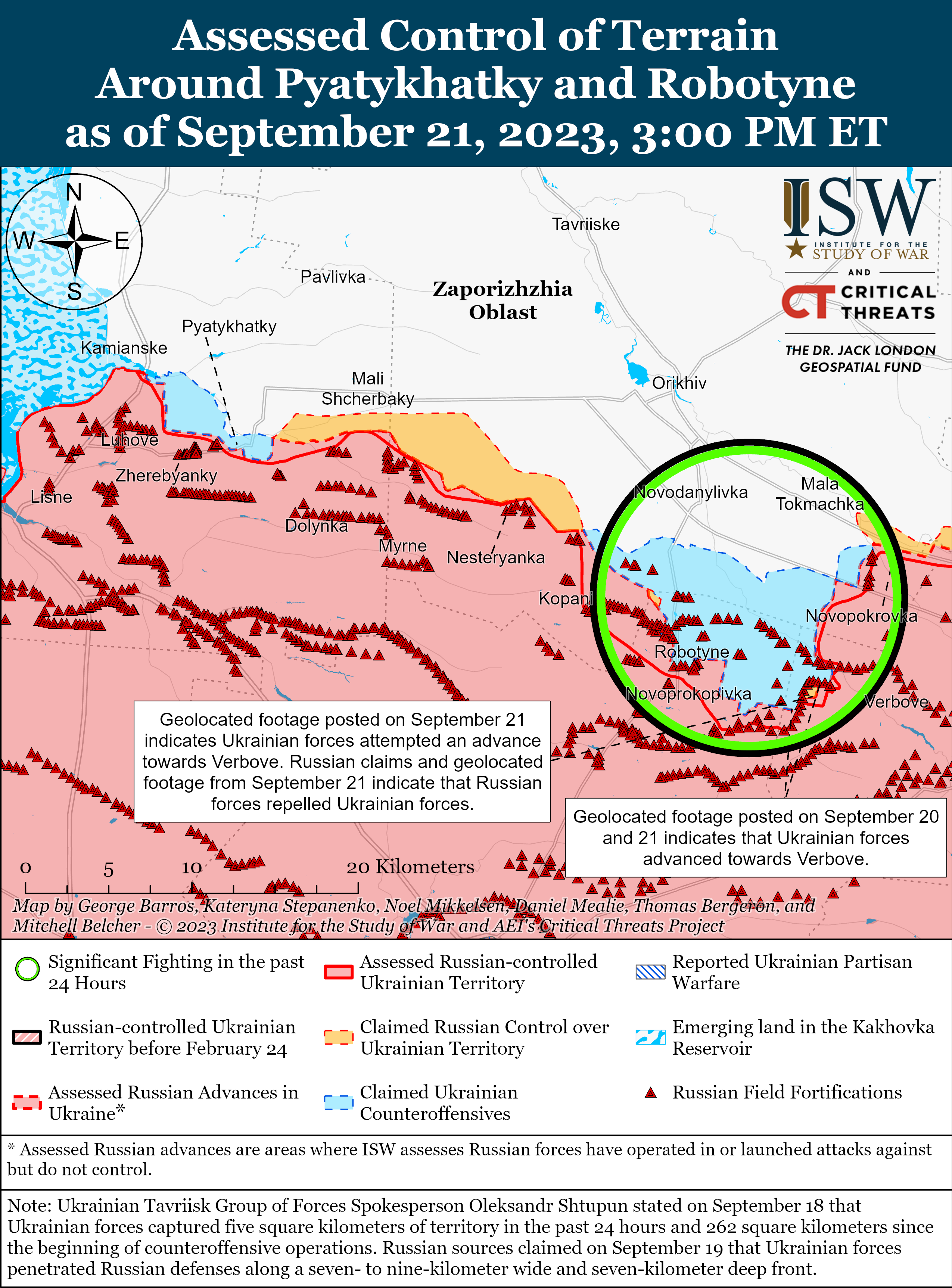
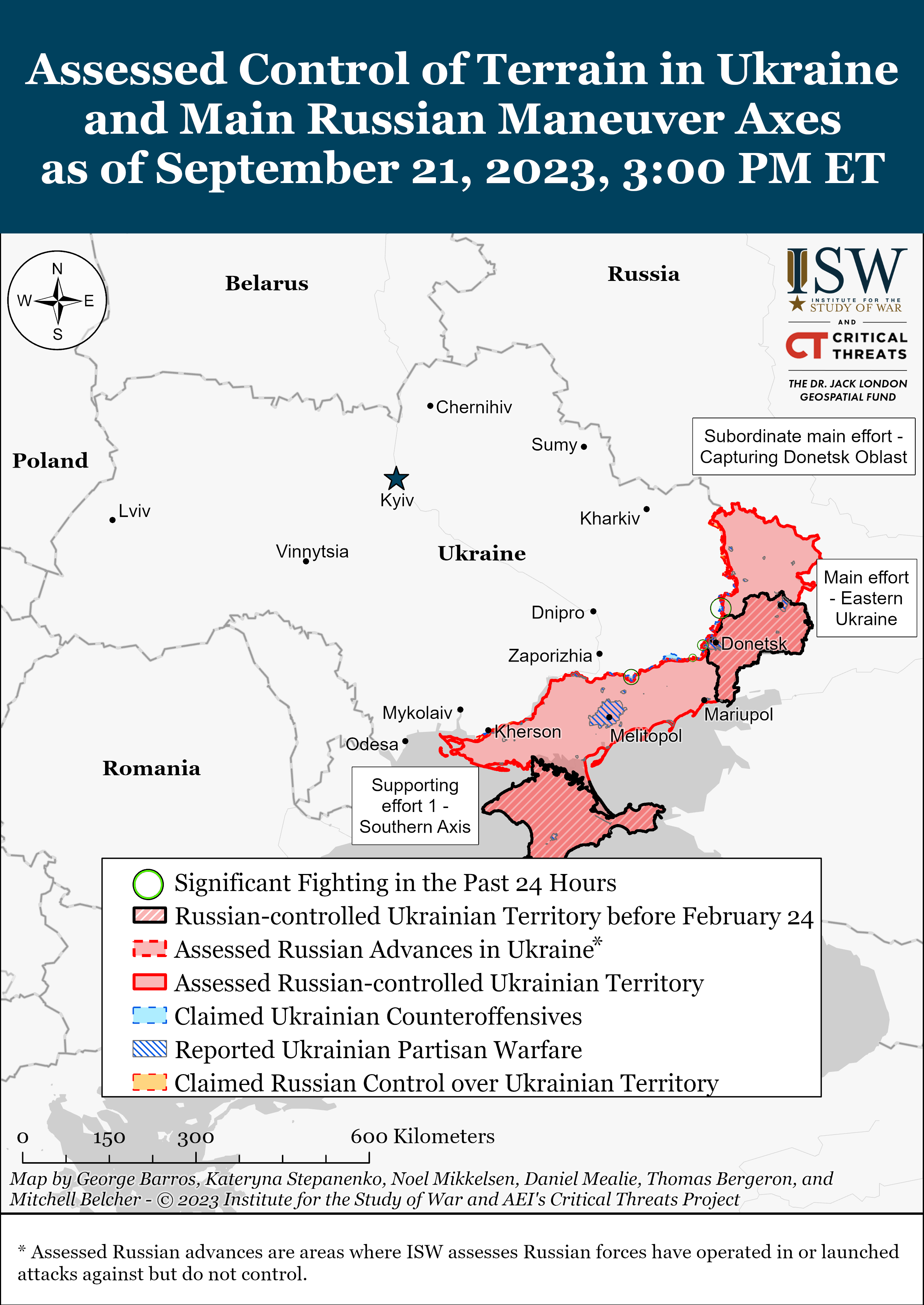
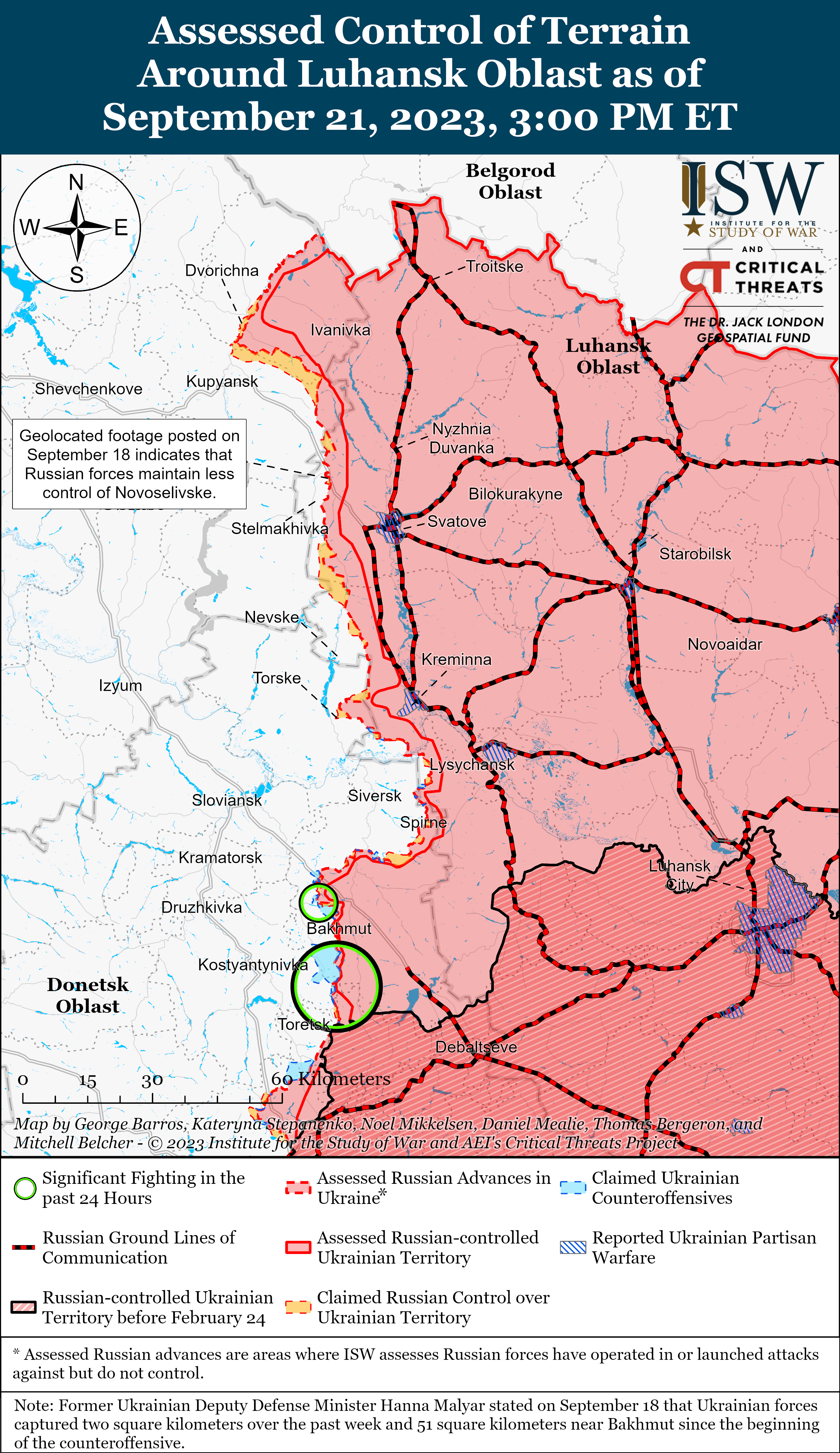
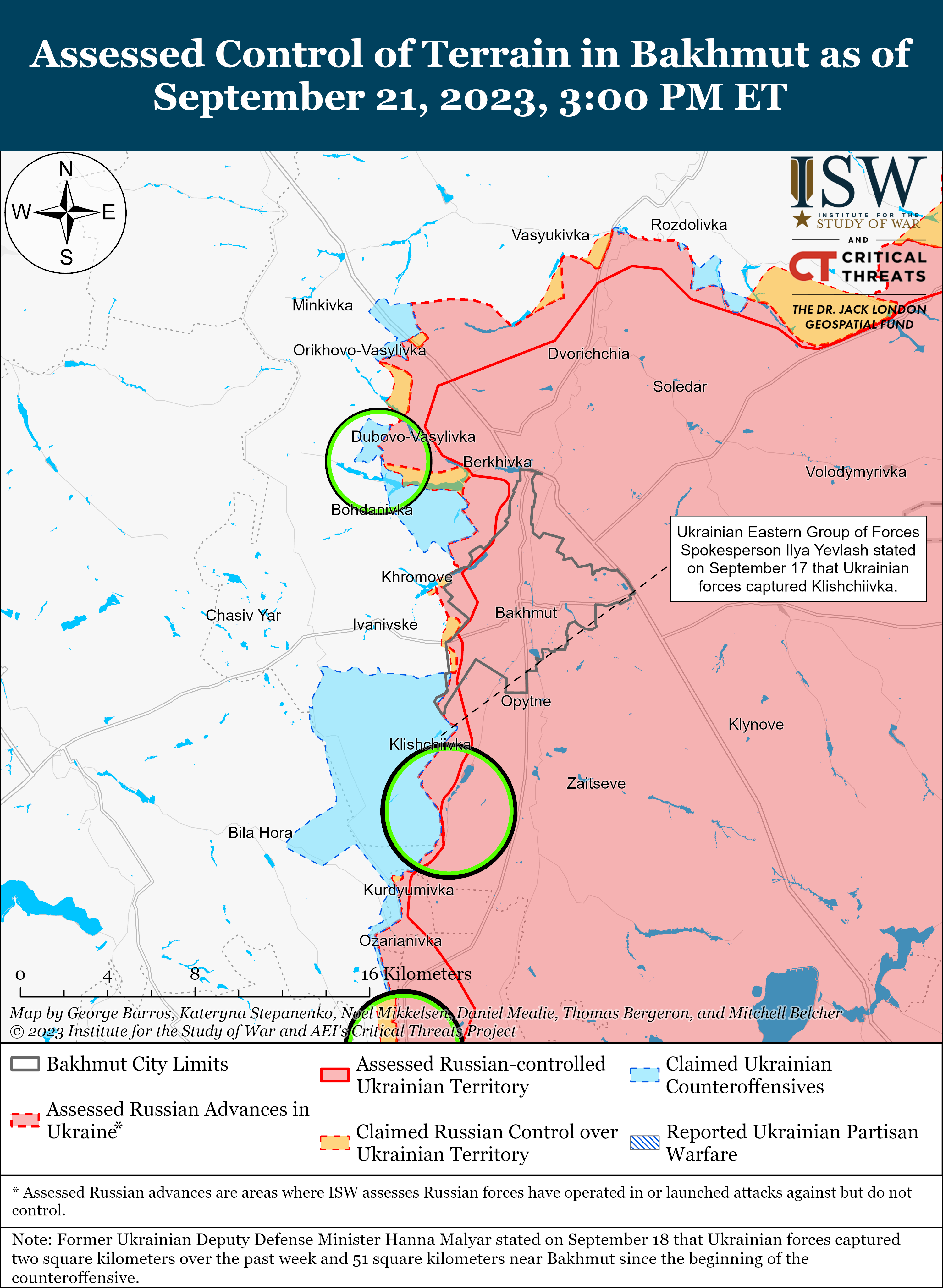
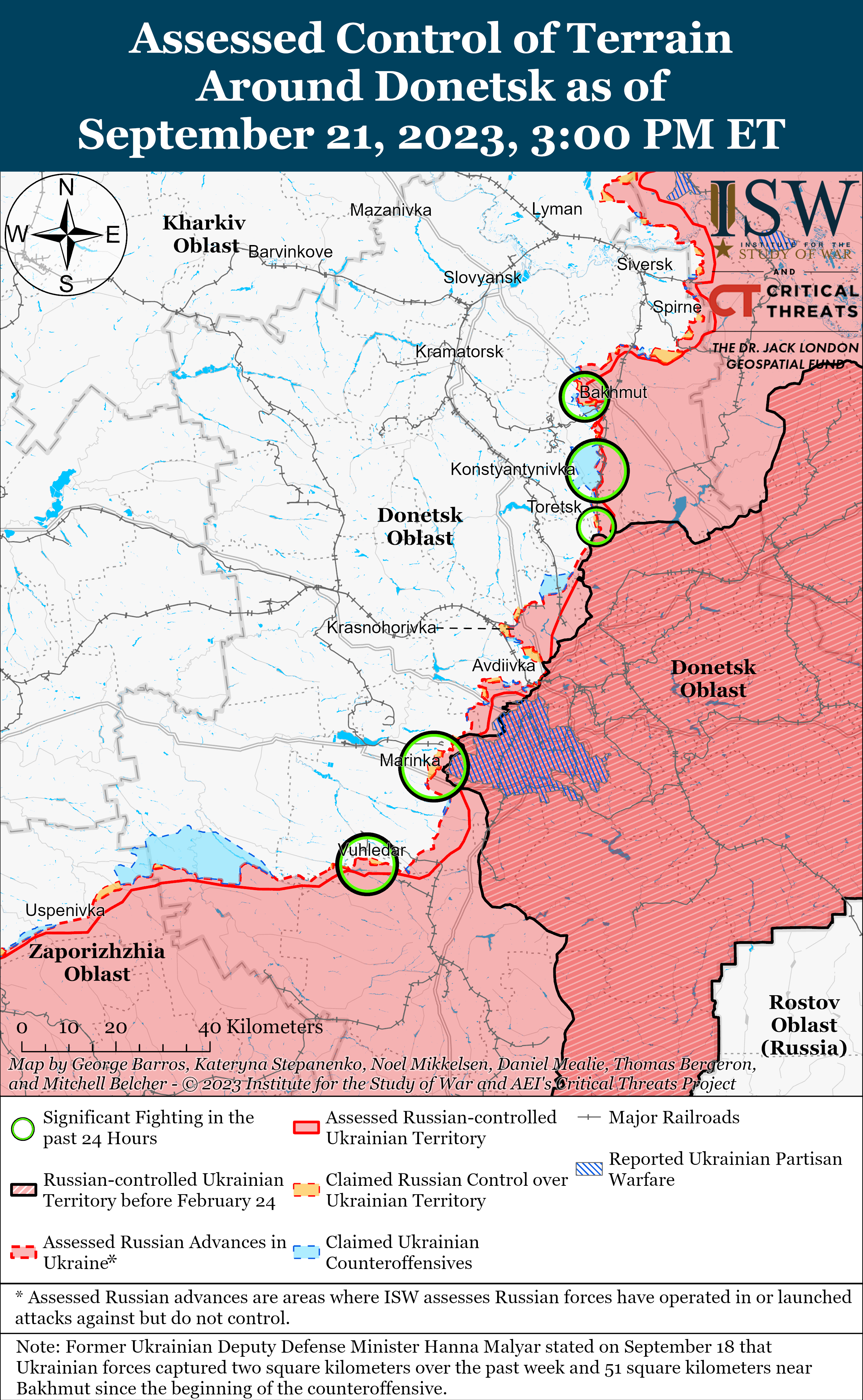
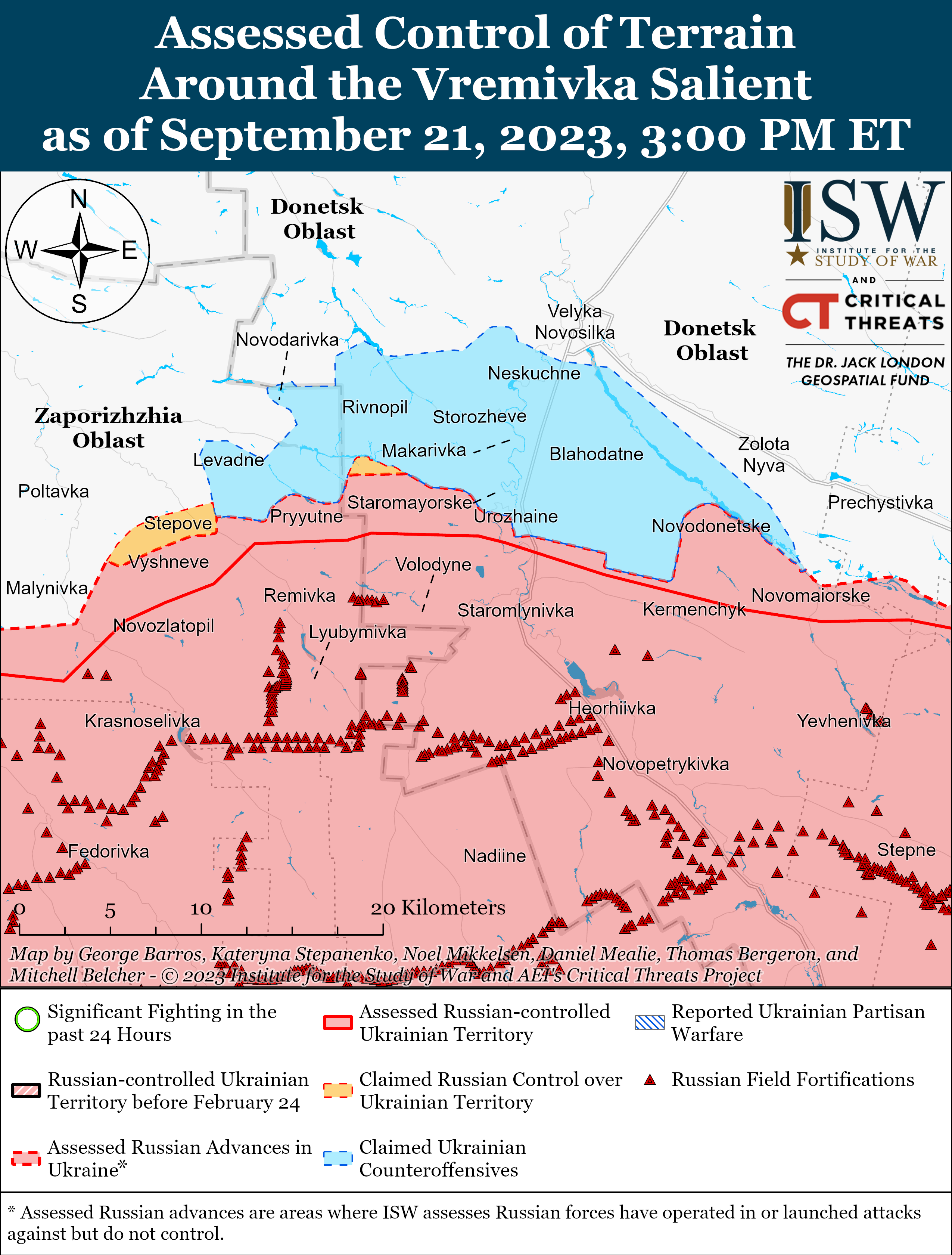
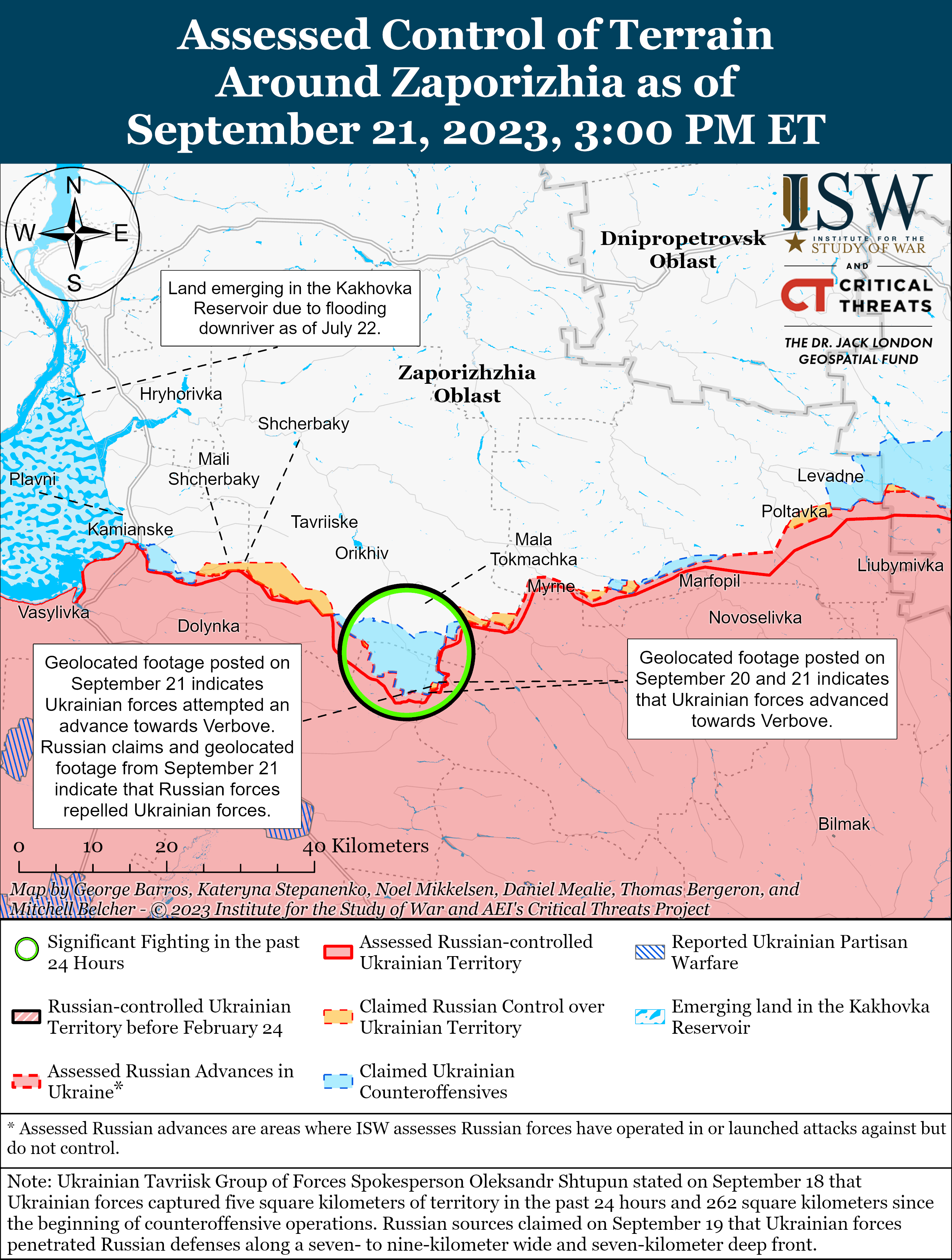
No comments:
Post a Comment